Life on the front line of the NHS can take you deep into the trenches, it can leave you balancing on a high wire as sharks circle below, and it can abandon you on a lifeboat in the deepest, darkest of oceans on the stormiest of nights, as you try to navigate your way through treacherous waters filled with the challenges of limited resources, overwhelming patient needs, and the unrelenting demands of the healthcare landscape.
Public satisfaction with the NHS is at its lowest ebb in over two decades, and the pressure of working in the belly of the beast can become debilitating and mentally exhausting. Years of studying and training for late nights, long hours and often loneliness. The person behind the profession is often chewed up and spat out into an unforgiving environment where the stakes could not be higher.
The challenges faced by the NHS serve not only as a call to action but also as an opportunity for innovation, compassion, and a renewed commitment to the fundamental principle that healthcare is a right, not a privilege, “You can’t be everything to the world and nothing to yourself,” explains Dr Ally Jaffee, a distinguished Multi-award-winning NHS Junior Doctor, whose passion for mental health and commitment to preventative healthcare is helping to change the culture and narrative around mental health.
Although darkness may often loom on the horizon, Dr Ally Jaffee is a light and voice for those who have become lost and disillusioned with a system that feels as if it’s holding on by its fingernails. She has been a catalyst for change as she raises awareness around issues affecting the mental health and well-being of those in the healthcare sector.
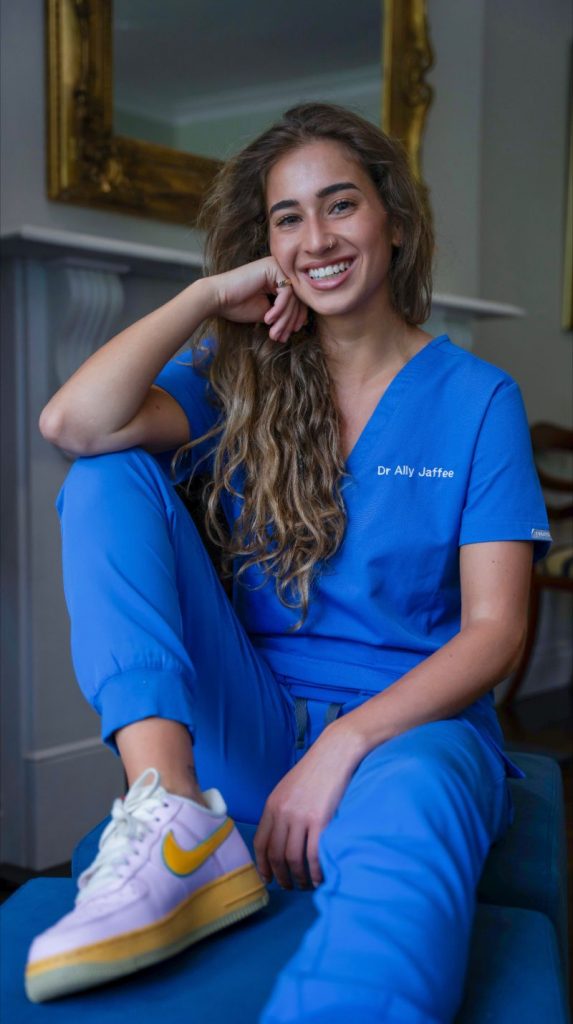
As a recipient of The Diana Award, an NHS Clinical Entrepreneur, Mental Health Speaker, Co-Founder of Nutritank, and author of 7 publications in leading Science Journals such as The Lancet, Dr Ally Jaffee is using her platform to open up about her battle and journey with depression so that future generations don’t need to go to the depths of despair that she’s been to.
She has spoken honestly about the need for the NHS to have a cohesive and supportive team and environment that allows doctors the chance to work in the best possible environment. “In the depths of my depression, I was drowning out at sea. Helpless and alone, trying to stay afloat, with the question, ‘am I going to sink or swim?’ Her anxiety and poor mental health became all-consuming and suffocating. She wasn’t sleeping, she wasn’t eating, she was exhausted. A candle flickering in the darkness waiting to blow out, she asked herself: ‘How can I treat patients if I feel so unwell?’
Ally sought the help she needed, and it was through opening up about her experiences that she realised the powerful effect it had in encouraging others to share their mental health struggles.
The culture of keeping calm and carrying needs to change, and Ally is helping to alter the dialogue surrounding support for doctors and the importance of compassion, empathy and human understanding. She is normalising the conversation around mental health and is using her pain as her purpose as she shares her struggles.
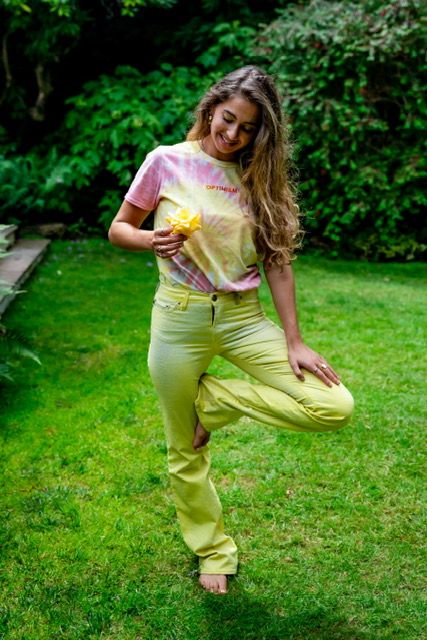
Born and raised in the UK, it was Primary School where Ally drew a picture depicting that she wanted to be an A&E Doctor. Much has changed since then, and as a teenager she discovered a passion for human stories and the magical twists and turns of the human mind, which propelled her to pursue a career as a Psychiatrist after becoming a Medical Doctor. Her dream remains to practice as a Holistic Psychiatrist – specialising in nutritional, lifestyle and creative interventions within mental illness.
Ally’s journey has been one of determination to succeed and resilience. She attended Highgate School, one of the UK’s leading co-educational independent schools and despite her passion for a career in medicine, she was unsuccessful in receiving a place at Medical School after applying for the first time in sixth form.
That summer of year 12, Ally received disappointing AS level results in her Science subjects, and was told not to continue her dream, that she wasn’t cut out for a career in medicine and that she should stick to her strength in English Literature. She didn’t let the words of others define her and turned her disappointment into determination and retook several of her AS science exams alongside her A-level exams and finished the year with straight As in Biology, Chemistry and English Literature.
Ally took a gap year to reapply to medicine and turned that year into an opportunity for further work experience, volunteering and travel. It was whilst observing practices in Australia and the USA that she realised her interest in nutrition, lifestyle medicine and holistic healthcare. It was in Australia that Ally learned she had received a place at Bristol Medical School.
It was in 2015 that Ally enrolled at Bristol Medical School, and In 2016, she volunteered at the College of Medicine’s Food and Medicine Conference. It was there she met the Chair of the College, Dr Michael Dixon OBE, an influential GP renowned for his advocacy of social prescribing and patient-centred care. In the following months, Ally was appointed national student nutrition lead.
Whilst at Bristol University, Ally realised just how little emphasis the medical profession puts on diet and lifestyle, despite the huge impact they have on people’s mental and physical wellbeing and future health. “Believe it or not doctors are not trained to understand or deliver nutrition and lifestyle interventions to prevent manage or reverse chronic disease in their patient population,” she tells us. It became her aim to put nutrition squarely on the curriculum so that the next generation of doctors could be equipped to prescribe ways for patients to help themselves.
Ally began her campaign in her second year at medical school and it was alongside fellow student, Iain Broadley, that she co-founded Nutritank. Its purpose: was to create an innovative hub of information and educational resources for food, nutrition, and lifestyle medicine to empower healthcare professionals to advise and inform their patient communities to live healthier lives. .
Working with collaborators including dieticians, the Association for Nutrition (AFN), and NNEdPro Global Institute for Food, Nutrition and Health, Ally and Iain set about the mammoth task of convincing every UK Medical school to commit to increasing nutrition and lifestyle education within their curricula.
Thanks to social media they soon gained mainstream media attention and found themselves on BBC News, Radio 4’s The Food Programme hosted by Sheila Dillon, as well as Channel 4 with Celebrity Chef and Public Health Campaigner Jamie Oliver.
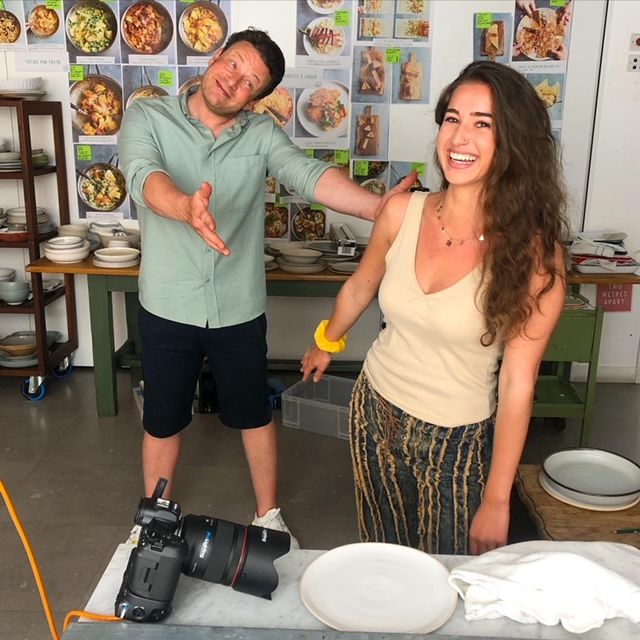
By 2019, they had secured the backing of the GMC to institute national change within all UK Medical schools. Since then, Ally has received numerous awards in recognition of her work. Including The Diana Award, which has the support of both Prince William and Prince Harry and is given out to just a few people around the world each year for ‘going above and beyond in their daily life to create and sustain positive change.’
It has been a hell of a journey for Ally, and it was an absolute pleasure for The Atlantic Dispatch to sit down with her as she opened up about her mental health struggles, the challenges she has faced, and her passion for psychiatry.
A lot of the time, my passion is my fuel
Nutritank was created in 2017 whilst I was at Bristol Medical School after discovering a huge gap in medical education that made zero sense to me. Believe it or not, doctors are not trained to understand or deliver nutrition and lifestyle interventions to prevent manage or reverse chronic disease in their patient population.
This startled me considering poor diet is the leading cause of early mortality and disability worldwide (The Lancet). What’s more, is the healthcare guidelines we use as health-age professionals in the U.K., the National Institute of Care and Excellence ( NICE) guidelines state as the first line of interventions for most chronic conditions to offer patients diet and lifestyle advice.
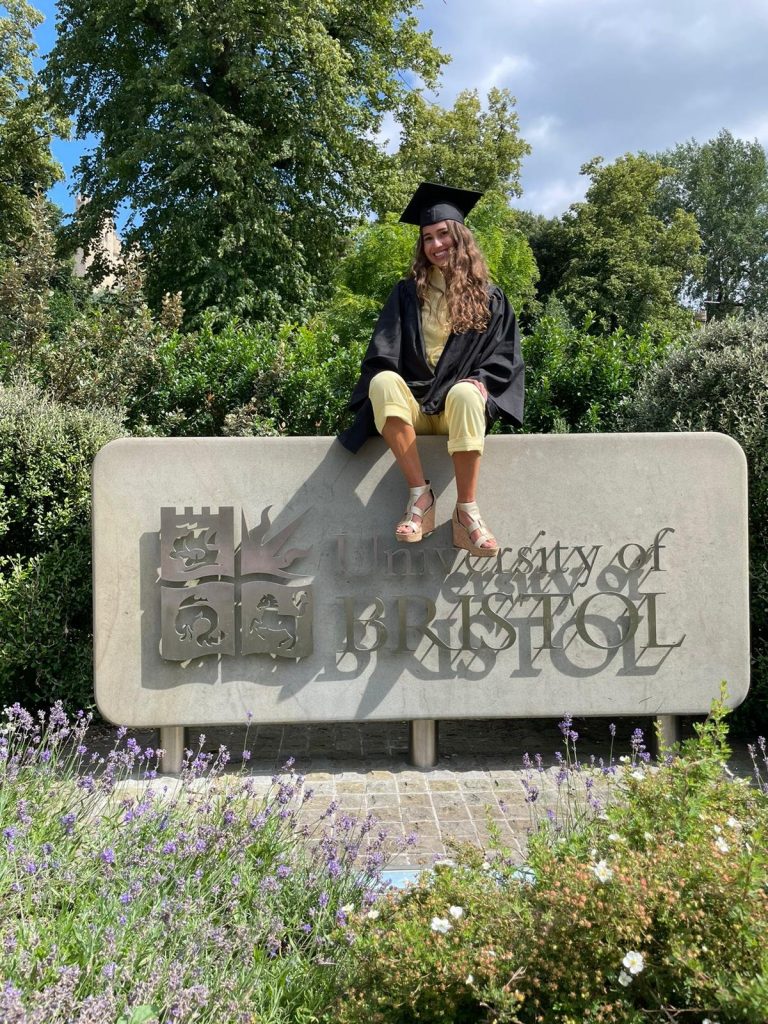
From our research which we published in The British Medical Journal ( BMJ), we found that the number one factor stopping doctors nationwide from discussing diet and lifestyle with their patients is due to a lack of confidence rather than a lack of time. This solidified the argument for that doctors and other healthcare professionals need to gain confidence through education, which is now at the heart of what we do at Nutritank CIC. We are a certified Clinical Medical Education (CME) provider and run weekly nutrition and lifestyle medicine webinars for healthcare professionals.
“Running my own organisation has only been possible as I work in a team alongside my other co-founder Dr Iain Broadley. Finding your tribe and people with complementary skills and shared values is paramount for success.”
There have been times when balancing being a full-time doctor and running Nutritank has been challenging but, as a team we support each other and make it work. A lot of the time, my passion is my fuel.
being recognised nationally for our work has been hugely gratifying
In 2018 we went viral with a BBC News article entitled ‘We learn nothing about nutrition, claim medical students’, which was exciting and accelerated our mission to the public.
One of my proudest moments has got to be working with Jamie Oliver. In 2019 we received an email from Jamie’s production company requesting for Jamie to come with his team to Bristol Medical School and film an episode for his channel 4 show “Jamie and Jimmy’s Friday Night Feast” all about Nutritank’s work and improving nutrition education within medical education.
We subsequently worked with Jamie’s Public Health team on a campaign called #nutrition4medics and successfully worked with the Department of Health to add an extra clause to the 2019 NHS Long-term plan for a greater commitment to nutrition training for healthcare staff.
I’d have to say the awards have really been some of my proudest moments – being recognised nationally for our work has been hugely gratifying. In 2019 we were stunned when we won the BBC FOOD and FARMING PAT LLEWELYN AWARD. What’s more, we received a dedicated congratulations video from Jamie Oliver that was played at the ceremony!
Then in 2021, I went on to win The Diana Award for young change-makers under 25 and in 2022 both Dr Iain and I were awarded the Prime Minister’s Point of Light Award.
THE TRENCHES OF CLINICAL DEPRESSION
A holistic approach to mental health is essential. No single intervention is a panacea for improving one’s mental health. There are many tools and pieces to the mental health recovery/ maintenance puzzle. Let me explain:
For years ago during medical school, when I was deep in the trenches of clinical depression, I had a lot of self-stigma and shame. As a medical student, I was passionate about becoming a doctor who looks after other peoples’ minds ( a Psychiatrist), I felt embarrassed that I was no longer able to look after my mind. So I delayed seeing my GP for a while.
Instead, I went to see a psychologist and tried talking therapy first. Somehow this felt safer and less daunting and intimidating. However, this approach did not go well.
At that point I was too deep in the black hole of Depression, that my cognitive function was not up to scratch to be sat across from someone trying to make sense of my mind. I had so much brain fog and found it impossible to concentrate and express how I felt, as I was hardly sleeping and not getting enough nourishment either, due to a poor appetite.

Not being in the right state to participate meaningfully in talking therapy compounded my warped beliefs of feeling like a failure. Eventually, I saw my GP and it was crystal clear confirmation that everything was in my head. My GP wasn’t going to judge me or make me feel less than and the help was always there, I just needed to ask. My GP gave me useful psychoeducation and determined it would be best to start me on an antidepressant.
This was something I was also dreading. Being on ‘happy pills’ was a big no in my stubborn mind. But wow was I glad to be proved wrong. I started on the medication and truly within 3 or so weeks I started to sleep better, experience less brain fog and was able to eat more. They had started to work for me and they were able to calibrate my physiology.
Was this all I needed to get out of the depression? No. But this was the start. The life jacket. I view my holistic recovery from depression like this:
In the depths of the illness, I was drowning out at sea. Helpless and alone, trying to stay afloat, with the question of ‘am I going to sink or swim?’ overpowering my thoughts.
Going to see my GP and being put on antidepressants was my life-jacket, the tool I needed to get my head above the water, get direction and clarity, so I could visualise the shore and land, I needed to swim to. Then, to have the strength to swim to shore is where all the other recovery tools come in.
I restarted talking therapy, and instead of Cognitive Behavioural Therapy (CBT), I did something called Innate Health and Resilience Training (Iheart), which provided me with education and a framework for managing my thoughts and emotions.
My appetite returned and I was able to nourish my mind and body with nutritious food. I began yoga and never looked back. I also began socially connecting again, after isolating and withdrawing from my social network. I spent more time in green space, prioritised my sleep and started expressing myself creatively through journaling and writing poetry.
All these varied interventions are what I call holistic mental health. It’s important to note that mental health recovery is personalised and all of the above worked for me but it doesn’t mean it will work for you. Medication worked for me but it doesn’t necessarily suit everyone. There is no one-size-fits-all when it comes to Mental Health.
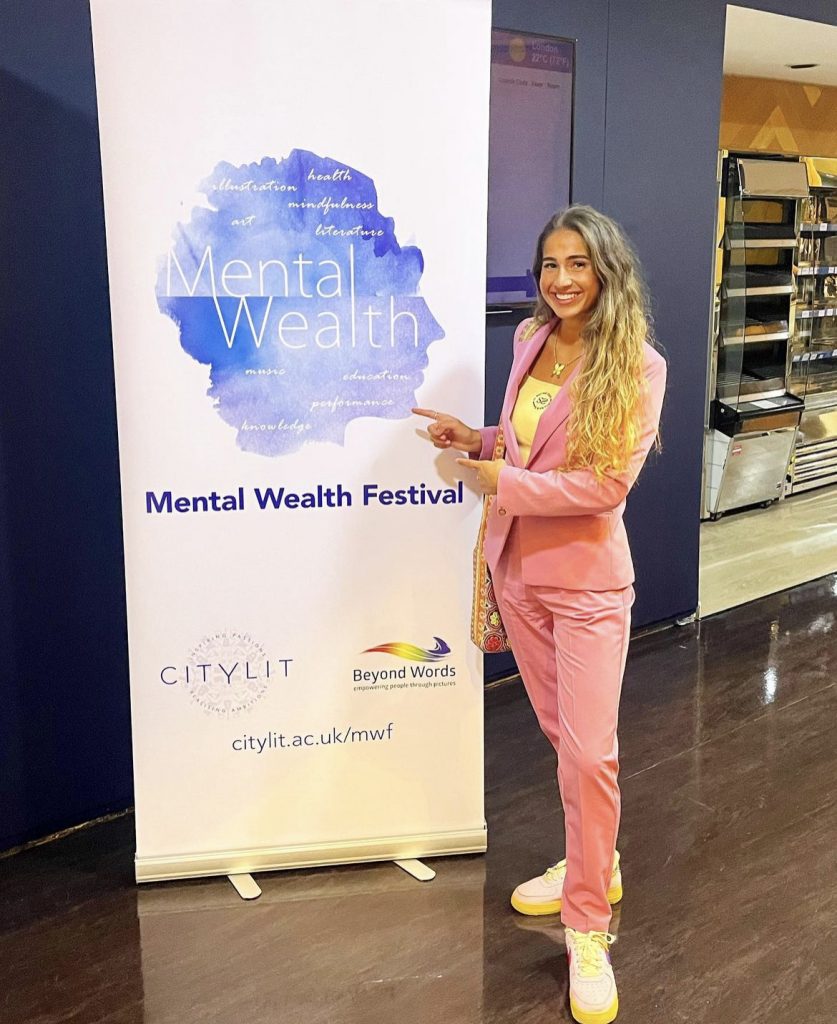
There’s so much left to discover within Psychiatry
Since I was a teenager I’ve been enthralled by the mind and learning more about mental illness. There’s no other job I’d do other than becoming a Psychiatrist.
There’s so much left to discover within Psychiatry, there’s huge room for innovation and many advances to be made. One of these advances is the field of Nutritional Psychiatry. It’s still in its infancy and is only 10 years old or so, but it offers great promise for better clinical outcomes for patients living with mental illness.
The field looks at how dietary interventions can improve symptoms of mental illness, prevent further relapses and could even promise remission in some cases.
The SMILES (Supporting the Modification of Lifestyle in Lowered Emotional States) RCT ( randomised controlled trial) led by Professor Felice Jacka and her team in Australia investigated the connection between food and mood by studying Female participants with major depression.
The participants were randomly assigned to one of two groups:
1: The control group aka ‘the befriending group’, was provided with social support.
2: The Diet group was provided with a dietary intervention- the participants were encouraged to follow a Modified Mediterranean Diet and were supported by Dietitian for dietary education, support and nutritional counselling.
The Mediterranean diet consists of fresh fruits, vegetables, whole grains, legumes, nuts, extra virgin olive oil, and fish and research shows its benefit for brain and mental health, as well as other health conditions.
At the end of the trial, a third of the participants in the dietary support group met the criteria for remission of major depression, compared to 8 per cent of those in the social support group. This was a landmark study highlighting the power the food we eat can have on our mood.
You can’t be everything to the world and nothing to yourself
Away from work, the arts are my greatest passion – I adore cinema, theatre and poetry. Halfway through medical school, I even took a year out to study an intercalated BSc at Imperial College London in Medical Humanities, Philosophy, Law and Creative Arts.
I think it’s important to make time to do the things that we love.
I think it is also vital to remember that, ‘You can’t be everything to the world and nothing to yourself.’ I constantly remind myself of this.
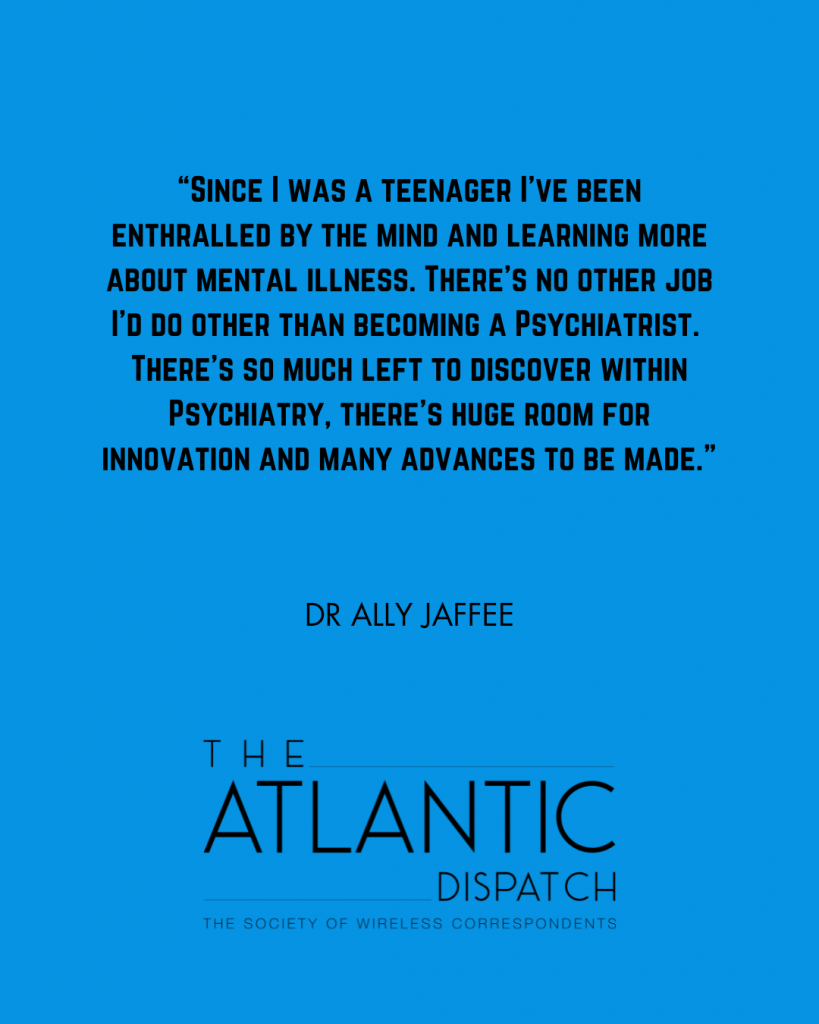
With all our thanks and gratitude to Dr. Ally Jaffee
LinkedIn/Instagram/Twitter: @drallyjaffee
